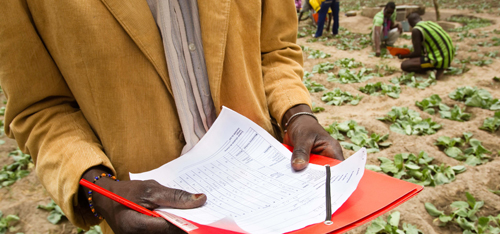Farmer field school approach
The farmer field school (FFS) approach was developed by FAO and partners nearly 25 years ago in Southeast Asia as an alternative to the prevailing top-down extension method of the Green Revolution, which failed to work in situations where more complex and counter-intuitive problems existed, such as pesticide-induced pest outbreaks.
In a typical FFS a group of 20-25 farmers meets once a week in a local field setting and under the guidance of a trained facilitator. In groups of five they observe and compare two plots over the course of an entire cropping season. One plot follows local conventional methods while the other is used to experiment with what could be considered “best practices”. They experiment with and observe key elements of the agro-ecosystem by measuring plant development, taking samples of insects, weeds and diseased plants, and constructing simple cage experiments or comparing characteristics of different soils. At the end of the weekly meeting they present their findings in a plenary session, followed by discussion and planning for the coming weeks.
Alternative practices are not automatically assumed to be superior to conventional practices. It is up to the farmers to decide what works best through his or her testing and observations. What the FFS does is provide a risk-free setting in which to discuss, dissect, modify and experiment with new agricultural management ideas.
In this field-based setting, farmers are able to investigate a wide range of topics, such as management of soil fertility and water resources; methods of local varietal selection and issues of seed quality; risks associated with toxic pesticides and implementation of low-toxicity alternatives; development of marketing skills; and diversification of farming systems with new crops for food, fodder and profit.
At a national and regional scale, the list of topics continues to expand. The learning-by-doing approach promotes farm-based experimentation, group organization and decision-making; thereby increasing the likelihood that farmers will eventually “own” and adopt improved practices.
At the end of the season, a typical FFS group holds a field day to show local politicians, government agriculture workers and other farmers what they are doing. Exchange visits with other FFS are also encouraged. The season-long approach helps build stronger social ties that carry on after the initial FFS.
Not all topics can be addressed in one season, and FFS groups often continue with new topics and activities in subsequent seasons. Exploring past trends, current status and future scenarios helps groups to prioritize needs, interests and actions for the future.
FFS national programmes are more than just a collection of FFS. They typically work at multiple scales to build social capital, for example by helping strengthen producer organizations and by contributing to greater organizational capacity along the entire value chain – from financing, post-harvest processing and marketing, to investments. FFS national programmes are now beginning to work together with other participatory, community-based initiatives, notably the Community Listeners’ Clubs.
Farmer field school facilitators
FFS facilitators come from a wide variety of domains. They typically include extension workers, NGO workers, farmer organization staff or previously trained farmers. Their role is to encourage active exploration and understanding of how farming systems work. They introduce new ideas through guided exercises and stimulate discussion “by farmers, for farmers”, without dominating the scene.
Facilitators go through rigorous, season-long training conducted by “master trainers” and follow the same “learning-by-doing” approach as the farmers they will eventually train in FFS. At the beginning of a country programme, master trainers are often brought in from other countries, where substantial experience already exists; thereby ensuring the highest possible quality in training through “south-south” cooperation. The facilitators and master trainers ensure linkages with district and national-level resources, helping to improve flows of information and knowledge sharing.

